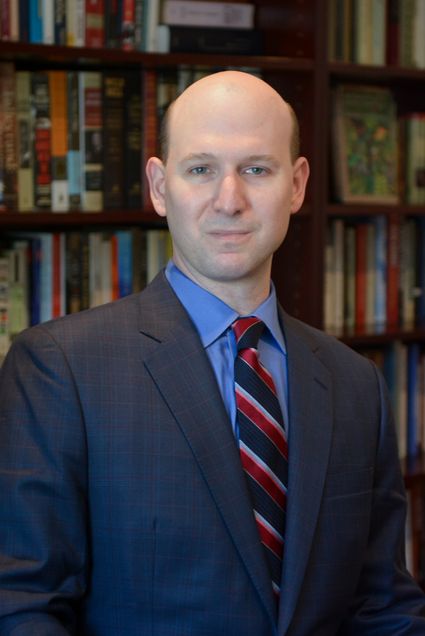Robert Sloane Lectures at Xiamen Academy of International Law
Professor Sloane will give a series of lectures entitled “From Leipzig to The Hague: The Past and Future of International Criminal Law.”
 This summer, Professor Robert D. Sloane, R. Gordon Butler Scholar in International Law, will engage some of the world’s sharpest emerging minds on a question that could prove crucial in the next few years: after centuries in which war crimes, crimes against humanity, and genocide have been routine parts of societal conflicts, why have we come to believe it is a moral or legal imperative to hold international criminal trials?
This summer, Professor Robert D. Sloane, R. Gordon Butler Scholar in International Law, will engage some of the world’s sharpest emerging minds on a question that could prove crucial in the next few years: after centuries in which war crimes, crimes against humanity, and genocide have been routine parts of societal conflicts, why have we come to believe it is a moral or legal imperative to hold international criminal trials?
“Napoleon, for example, was exiled, not tried,” Sloane observes. “For centuries, most aggressors and architects of genocide, war crimes, and other mass atrocities were summarily executed. Why do we now believe it’s worthwhile or appropriate—and only in the exceedingly rare cases in which such criminals can be apprehended—to put them on trial instead?”
The Xiamen Academy of International Law has invited Sloane to serve as a lecturer of international law for its 2016 summer program.
The academy, attached to Xiamen University in the city of Xiamen on the southeast coast of China, aims to offer an advanced course of study to scholars and practitioners in the world of international law—diplomats, lawyers, professors, and others.
Founded in 2005, the Xiamen Academy was designed as a counterpart to The Hague Academy of International Law, which has been operating since 1923. The Hague Academy has taught students who went on to become influential figures in the history of the next few decades, such as Nobel Peace Prize winners, heads of state, judges for national and international courts, law professors, and even future US Senator Ted Kennedy.
Xiamen Academy’s class of 2016 will bring together international leaders and promising figures from a wide range of backgrounds and perspectives.
“The students will range from undergraduates to post-doctoral scholars and practitioners, including, for example, a diplomat, a senior editor at the United Nations, and a researcher from China’s National Marine Data and Information Service,” Sloane says.
This year’s class includes students from nations worldwide, including not only mainland China, but also Hong Kong, the United States, Germany, the Netherlands, the Philippines, Bangladesh, Germany, Korea, Sri Lanka, Georgia, and Trinidad and Tobago.
Sloane will teach a week-long lecture series entitled “From Leipzig to The Hague: The Past and Future of International Criminal Law.” In addition to giving his students an understanding of the history and substance of international criminal law and major controversies and issues in the field, Sloane hopes to examine the field’s undertheorized rationales.
While it might seem obvious at first, Sloane says, when you start to interrogate the issue, it becomes more complex. “I hope to encourage students to consider a question at the core of any system of criminal law, domestic or international: Why punish? What is it we’re trying to achieve with a system of criminal law? And in particular, what’re the rationales and goals in the context of international law?”
“The issue’s especially compelling absent evidence that international criminal courts, which have already cost, in the aggregate, billions of scarce international dollars, achieve the traditional objectives of criminal justice systems, such as deterrence,” Sloane says. “And what alternative rationales, if any, might nonetheless justify those costs? I have views, of course, but don’t know the answers. I see teaching at the Xiamen Academy as an invaluable opportunity to reexamine the issues and engage foreign students and colleagues with perspectives that may well be very different from my own.”
Sloane graduated with a JD from Yale University in 2000. He has worked in the field of international law for most of his career. Commenting on why he chose to pursue a career in international law generally, Sloane says that it is hard to imagine a field of law that offers more intellectual engagement and the chance to confront such a diverse range of issues.
“International law’s a field in which many areas of law—and not only law but also history, philosophy, international relations, economics, and political science, among others—converge; and also intersect with some of the most significant current events of our time,” Sloane says.
Sloane is a well-credentialed scholar and attorney in the international law arena. In 2002–2003 he was a litigation associate at Debevoise & Plimpton, where among other things he represented Mexico before the International Court of Justice. He earned a high-level diploma from The Hague Academy in 2007. His scholarly writing has won awards from the American Society of International Law. He has served as a visiting professor at Yale Law School, Harvard Law School, the Fletcher School of Law and Diplomacy of Tufts University, and the University of Michigan Law School.
He still practices as well, having been involved in arbitrations before the International Court of Justice, the International Tribunal for the Law of the Sea, and tribunals under the auspices of the International Centre for the Settlement of Investment Disputes, the International Chamber of Commerce, and the Permanent Court of Arbitration.
“Harold Koh [former legal adviser to the US State Department], who I had the good fortune to learn from and work with during law school, often quoted a Korean maxim: ‘Theory without practice is as lifeless as practice without theory is thoughtless,’” Sloane says. “Few areas of law, in my experience, better enable a career that’s as fulfilling in this sense.”
Reported by Trevor Persaud (STH’18).